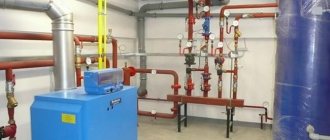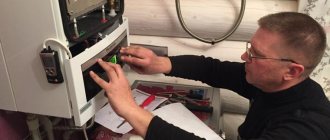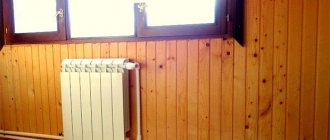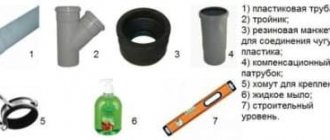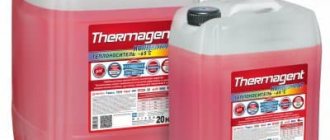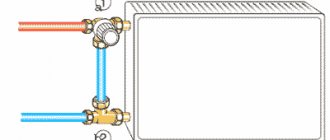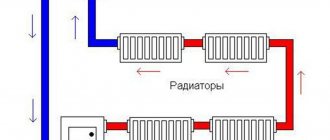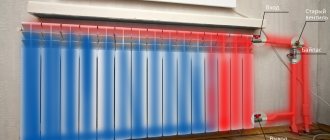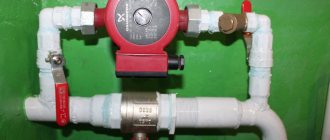Often in an apartment or room of a private house you can hear sounds made by heating communications. It can be noise, and periodic crackling, and even hum, and clicks, and seething. Why heating pipes are knocking depends on the type of problems with the system that appeared during operation or were caused during its installation. The causes and sources of sounds must be eliminated, since they affect the comfortable stay in the apartment or house, and can also provoke serious pipeline accidents.
Knocking in heating pipes and radiators can occur for various reasons, but any of them must be eliminated as soon as possible
Characteristics of noise in heating pipes
When talking about unwanted noise effects in heating system pipes, we should first mention a few words about the difference between noise and sound. If sound waves are characterized by a certain frequency and amplitude, then noise vibrations are characterized by randomness, lack of uniformity and rhythm. The noise level is measured in decibels, and its normal values are up to 30-40 decibels in an apartment and up to 45-55 decibels on the street. Anything that exceeds this level is a deviation from the norm and causes acoustic and psychological discomfort to a person.
Installation of communication systems in a home is carried out in such a way that the noise emanating from them is not felt by residents and falls within the framework of sanitary standards. This also applies to heating pipes, and therefore the appearance of hum, crackling, knocking and other audible noises in them indicates a problem with the heating system.
As an exception, it is worth mentioning the noise that occurs in heating communications during the first start-up of the system. This kind of knocking or crackling noise in heating pipes is not unusual - it is usually associated with pressure drops in the supply and receiving pipelines when water is first supplied to them. Subsequently, as all pipelines of the system are filled with water, the noise in them weakens and then stops completely.
Noise effects resulting from malfunctions in the system can be of various types: hum, crackling, clicking, knocking, bubbling, etc. Their reasons may be related to errors made when installing heating pipes, or may arise during operation (read: “Causes of noise in a heating pipe and solutions”). Noises of different natures have different origins, and therefore identifying the type of noise plays an important role in establishing its causes.
Noise, hum, buzzing, extraneous sounds
There can be many reasons for constant noise in heating radiators. Let's look at them in order:
Wrong pipe diameter
Sometimes heating pipes are of different diameters and are connected by adapters. Because of this, a pressure drop occurs and turbulence appears in the water or coolant. They lead to vibration and extraneous sounds.
Often a change in diameter occurs due to clogged pipes. Sediments can accumulate on their inner walls. This results in reduced throughput.
The only way to solve the problem is to cut off the old pipes and install new ones.
Pressure drops
Due to pressure surges in the heating system, vibration may occur. The reason for this is uneven operation of the circulation pump.
If you live in an apartment building, you can install a bypass. It will help compensate for pressure changes. But it is best to contact the utility companies.
If you have your own heating system, perform diagnostics and maintenance of the circulation pump. And best of all, call a specialist. This can be done using the service for selecting private specialists PROFI.RU .
Flow rate
Some people incorrectly calculate the number of radiator sections. Because of this, it is cold in the house or apartment in winter. To compensate for this moment, you can increase the flow rate of water or coolant. But at the same time, unwanted vibrations will occur in the radiators.
Incorrect pipe laying
Many people hide heating pipes in the wall, but do it incorrectly. They simply lay them in a groove, and then cement or plaster them. As a result, the pipe remains rigidly fixed.
Due to heating and cooling, the diameter of the pipe changes. Cracks appear in the concrete and cavities form. They work as a resonator and amplify the sound of water or coolant flowing through the heating system. A hum or buzz appears, the source of which is difficult to detect.
The only solution to the problem is to open the pipes and lay them in soft thermal insulation (see photo). It compensates for expansion and also reduces heat loss.
Thermal insulation for heating pipes.
General wear and tear of systems
The reason for the appearance of extraneous sounds may be wear and tear on the heating system elements. Sources of noise can be faulty or broken:
- Fitting;
- Three-way valve;
- Coolant pressure regulator;
- Radiators;
- Circulation pump;
- Heat source (gas boiler, boiler, etc.).
It is important to remember that sound is transmitted very well through metal pipes. If your gas boiler is noisy, this will affect the volume of the entire system. This option should also be taken into account.
Causes of humming and whistling in heating system pipes
Whistling or humming in heating pipes is quite common, and among the main factors for their occurrence are the following:
- leaks in the heating system;
- the appearance of narrowings in the lumen of the pipes, interfering with normal water circulation;
- the use in some apartments or premises of a residential building of pipes of a smaller diameter than in the rest of the heating communications.
If the reason for the humming pipes is unclear, you should first find out if there are any leaks in the heating system. For this purpose, it is necessary to inspect all apartments and rooms in the house, but if a water leak is not found in them, then also the basement, in which the main plumbing and heating structures are usually located.
Most often, leaks form in fistulas of heating pipeline structures or in valve connections. If such a leak does occur, it is usually not difficult to detect it with careful examination: as a rule, a small stream of water flows from the problem area and a small cloud of hot steam comes out. A stream of water can be detected at some distance from the leak site, and the hum of pipes can sometimes spread over quite significant distances.
If a careful audit reveals that there are no leaks in the system, then another likely cause is a decrease in the flow of pipes in a certain area. The location of this defect is determined by ear by examining the entire heating system. The identified problem area must be replaced. In any case, to repair and restore the damaged area, it would be correct to call a plumber, since this task may not be possible for a non-specialist.
How to solve noise problems
It often happens that the heating device becomes clogged from the inside.
In this case, pieces of slag will move along the radiator along with the flow of water, touching the walls. In this case, flushing will help. A hose is put on the faucet, and the water along with the debris is gradually drained.
Video:
If the procedure does not help, at the end of the heating season the radiator will have to be dismantled, disassembled and cleaned, or replaced.
An air lock in a heating device is a common cause of unpleasant gurgling sounds.
This problem is solved with the help of a Mayevsky crane, which will allow the air to be released and the battery to continue to operate silently.
Quite often, at the beginning of the heating season, problems with noise in pipes can arise due to pressure that is not fully equalized.
When the pressure difference in the pipeline exceeds 1.5 atmospheres, tapping may begin.
In this case, the specialist must install a washer in front of the regulator nozzle, which will equalize the pressure.
In an apartment building, a circulation pump is responsible for the movement of warm water through pipes and heating appliances in apartments.
If for some reason it starts to work incorrectly, then specialists must determine the solution: it may be necessary to install a special valve that will correct the operation of the pump, or it may even go as far as replacing the unit.
If the cause of the noise is identified in the place where the heating battery connects to the bracket, then you should think about replacing the brackets or choose a simpler method - place a rubber pad between the battery and the fastening element to prevent friction.
You can identify the leak yourself. To do this, just inspect the pipes in your apartment or house. If one can be seen with the naked eye, then this is good luck, and corrective measures can be taken immediately.
Having found out that everything is normal in the apartment, you need to go around the neighbors to look for the pipe from which water is leaking.
Video:
If your neighbors also do not find a leaking pipe, then it is necessary to inspect the main unit of the heating system.
In an apartment building, it is located in the basement, going down into which you can immediately come across steam - it is this that signals the location of the breakthrough.
In this case, the emergency service is immediately called.
As it turned out, there are various reasons for the unpleasant sounds emanating from radiators. But it will be easier to find out the reason now.
In most cases, it is better to solve the problem of eliminating noise according to the opinion of specialists, because they are guaranteed to have experience, knowledge, special tools and spare parts.
The main thing is not to hesitate, because this will help to avoid emergency situations in the future.
Why do you hear clicking, crackling and knocking noises?
The appearance of clicking or crackling noises in the heating system pipes usually indicates that foreign solid particles have appeared inside the communications. The impact of such small particles on the pipe walls is the direct cause of such noise.
As a rule, heating pipes knock and click when the following problems occur:
- wear of some key elements of the system;
- valve valve malfunctions;
- expansion of metal heating pipes under the influence of heat.
In most cases, knocking in the heating pipes of a private house or apartment building can be eliminated by simply draining the clogged water from the heating system and replacing it with clean water. If such flushing does not eliminate noise, then the faulty parts of the system must be replaced. In particular, valve valves are subject to inspection, problems with which are often the cause of such noise.
Another reason for knocking in heating pipes may be the thermal expansion of metal pipeline structures. Usually in this case, the crackling and knocking noises are quiet and intermittent. The expansion of pipes can lead to slight movements and disruption of the fastening of some structural elements, which leads to noise of this kind. To solve this problem, it is necessary to inspect the places where various parts and elements are fixed, and, if necessary, re-fasten them.
Finally, another reason that can lead to clicking and knocking in heating pipes is the so-called water hammer. It occurs when the water circulating in the pipes is instantly shut off by closing the valve, valve or tap. Since the compressibility of water is practically zero, and stopping the water stream cannot happen immediately, for a short time, at the point where the tap is suddenly closed, the pressure can jump by tens of atmospheres. This can lead to malfunctions of valves, valves, threaded connections with clicking or crackling sounds, and even failure of some parts. Therefore, to avoid this, you should not suddenly shut off the flow of liquid circulating in the heating system.
Natural noise
The rumble of water in pipes and hum are associated with uneven flow of liquid. There are three reasons why the coolant makes noise in the pipes:
- Air that has entered the system through leaks in threaded connections or for other reasons;
- Joining of lines of different diameters, causing acceleration or deceleration of flow;
- Internal obstacles include poor-quality welds, corrosion, scale and dirt accumulated in radiators.
If the water makes a slight noise in the pipes, a hum is heard, then this is not as critical a situation as when knocking occurs. But something needs to be done immediately about the sudden noise. For example, remove air from the heating system, the accumulation of which will ultimately lead to a stop of thermal convection.
When eliminating air pockets, the temperature of the coolant should not exceed 40°, otherwise there is a risk of burns. To do this, you need to use special Mayevsky taps, which should be equipped with all radiators or one, but the top one in the group. In a single-pipe system, air begins to be expelled from the device, which is located at the lower end of the collection line (the last one from the boiler in the direction of the coolant).
You should not overload radiators with additional devices - meters, regulators, etc., which create additional resistance to flow. When the coolant is forced to overcome these obstacles, the pipes hum louder. At least once every three years, you need to descale the system by heating it with a coolant to which chemical reagents have been added, and then washing it. There is no need to empty the system for the summer, this accelerates corrosion processes in the riser and radiators.
Sometimes during heating, squeaks, crackling noises, and other noises occur in the heating pipes. This is due to their thermal deformation. The process, unfortunately, is inevitable, but it can be reduced if you use homogeneous materials. For example, you should not connect metal-plastic pipes with antediluvian cast-iron radiators. The linear expansion coefficient of these materials varies significantly.
If a circulation pump is included in the heating circuit, then during its operation the radiators may begin to make a high-pitched noise (whistle). This makes air noise as it escapes through microcracks in the seals of threaded connections. Do not use tow or oil paint to insulate connections. It is recommended to seal using FUM polymer tape or red (heat-resistant) silicone sealant.
Seething water in heating pipes and radiators
Sometimes you have to deal with a problem such as bubbling or gurgling water inside heating lines. This noise occurs due to the appearance of air bubbles inside the water. In addition to noise effects, another undesirable consequence of this problem is a decrease in the temperature of the coolant and the efficiency of the system as a whole.
If seething or gurgling noises occur, the system should be checked for the presence of slopes and distortions, in which a layer of air can form and stagnate. In some cases, to remove air bubbles from the heating system, special air vent valves are installed in the structure on the upper floors. In other cases, it may be necessary to correct distortions and slopes, which requires shutting off and stopping the heating in the entire house.
What to do if the patency of the pipes has decreased?
To fix this problem in the heating system, you need to find the source of the sound by ear. To do this, when passing by the pipeline, they listen and where the noise is louder, the network is narrowed.
If they live in an apartment building, then it is necessary to check the beds and elevator units - these are places where the coolant flow is fast, and if the permeability of the pipes has decreased, then it will slow down and an unpleasant sound will be heard.
If the heating system narrows in the riser, then this will be noticeable, since compared to neighboring radiators, yours will be colder. If the connection is bottom, then a pressure difference occurs between the supply pipe and the return pipe. And if the connection is lateral or diagonal, then the difference occurs at the top and bottom of the riser.
To fix the problem, you need to call a plumber.
But if after this the question arises: “why are the heating radiators crackling?”, and other extraneous sounds also interfere, then the reason for this may be the formed scale, a piece of slag or scale, which is located across the pipe.
To eliminate this problem, sometimes it is enough to simply stop the shut-off valve, which is located in the direction of coolant circulation, but above the blockage area. At the same time, it is necessary to open a discharge located below the site of contamination. The created countercurrent can carry out splinters and debris.
Other sources of noise in the heating system
In addition to the reasons mentioned above, the following factors can be sources of various noises in heating communications:
- sudden pressure surges for one technical reason or another;
- non-compliance of the coolant with technological standards;
- noises coming from pumps in the boiler room.
To prevent sudden pressure changes in heating systems of private or apartment buildings, it is recommended to install special control devices. Sometimes the noise can be caused by pumps located in the boiler room, the operation of which can lead to resonance in the water-jet elevator of the heating system. In some cases, the resulting buzzing or crackling can be eliminated by installing a valve between the elevator and the pipe.
To prevent noise in heating pipes, it is recommended to avoid using threaded valves, and instead install ball valves that close the water flow by turning 90°. They are much more reliable for such systems, and their operation is almost unaffected by coolant flows or other mechanical factors inside the structure.
Batteries click, shoot, knock
If a thermostat (thermal valve) is installed in the heating system, this may be the reason. Check if it is positioned correctly. On its body there should be an indicator of the direction of water or coolant flow (see photo). The only option to get rid of the knocking noise in the battery is to remove it and put it in the right direction.
Don't be lazy! Check right now whether the regulators in your apartment or house are installed correctly
Sometimes pipes may knock. This happens when they are located too close to a wall or furniture. Due to strong pressure, the heating system may begin to vibrate. Moreover, this is not always noticeable to the eye. You can solve the problem by wrapping the pipe in insulation or a thin piece of rubber.
Knocking in boilers and pumps
Boiler equipment used to equip heating systems can operate on various types of gaseous, liquid or solid fuel, or also on electricity. However, the operation of boilers of any type may be accompanied by certain side processes, which often affect the heating system and can cause noise in it.
In particular, wood or coal solid fuel can lead to clogging of the chimney with a decrease in draft force. The operation of boiler houses using liquid diesel fuel may be accompanied by incomplete combustion and accumulation of soot. All this often leads to noise and humming in heating communications, and requires measures to eliminate these problems.
Noise may also appear due to malfunctions of pumps, valves or other devices and mechanisms located in the boiler room or basement. The solution to the problem in such situations is to repair faulty elements or replace them.
In general, any specific situation with the occurrence of noise in the heating system requires an individual approach, and there cannot be universal methods here. In some cases, identifying and eliminating faults on your own can be very difficult, and in this situation, the only way out of the situation is to contact qualified specialists.
Troubleshooting Methods
In a centralized heating system, only employees of the operating company can eliminate the problem of hum in the riser. You can submit an application by writing an application and submitting it to representatives of the service company.
If there is noise from the autonomous heat supply batteries, you must contact a heating engineer to diagnose the system and troubleshoot the problem.
Having identified errors made during installation, the technicians will be able to localize the cause and eliminate the defects, but for an additional fee.
You can try to localize the cause of the appearance of characteristic sounds yourself. To do this, follow this technique:
- Observe the frequency of sound occurrence.
- Try to determine the dependence (pressure surges in the system, temperature increases).
- With independent heating, where the boiler may be the suspected culprit, make sure that the noise comes from the unit itself and not from elements associated with it.
Diagnosis of fastening elements is carried out through tactile perception. If, in addition to noise, you feel strong vibration, install additional fasteners.
To get rid of the air lock, stop the autonomous heating supply. When the temperature drops to +25-30°C, open the Mayevsky tap slightly, waiting until the system gradually fills. The air pocket will disappear after 1-2 minutes, leaving the pipe along with the coolant. After that, start the system and listen: if the cause is eliminated, the effect will no longer occur.
This process is clearly shown in the video:
Having determined that the cause of the noise is the system being clogged with debris, you can eliminate the problem by cleaning it. To do this, you should first check the condition of the mesh filter, and then clean the system itself using one of two methods:
- Chemical - involves treating the internal walls of the equipment using special reagents that decompose the blockage into small fractions. After this, the remaining debris dissolved in water is easily washed away from the mains.
- Hydrodynamic - limescale and debris are removed from the battery and pipes under the influence of strong water pressure.
Often the source of noise is faulty components of the heating system, for example, a drain valve or an air vent. In such a situation, it is necessary to replace them and reinstall them.
If the problem is the pressure drop in the circuit, you can solve the problem by installing a regulator or a special washer in front of the elevator nozzle, which can be purchased at plumbing supply stores
The characteristic clicks that occur when the metal elements of the line move involuntarily when heated are quite easy to remove. It is enough just to place rubber gaskets between the battery and its mount.
If the difference in pipe cross-sections is not taken into account during installation, noise can be eliminated by balancing the cross-sectional diameters of the water supply elements. This will allow the liquid to circulate freely throughout the system.
If the cause of the noise is improper operation of the boiler or pump, the issue should be approached comprehensively. It is necessary to check the operation of the units through a complete diagnosis, which is almost impossible to carry out at home without the use of special equipment. It is better to entrust this work to professional repairmen.
